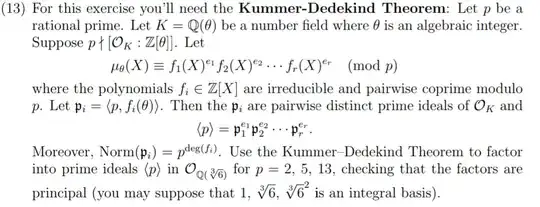Sorry for this scrappy answer.
The idea is to exploit the isomorphism:
$Z[a] \rightarrow Z[x]/(f(x))$
Where $a$ is an algebraic integer and $f()$ is its minimal polynomial. $a$ is sent to $x$ and vice versa.
You should know that prime ideals $\mathfrak{p}$ in $Z[a]$ correspond to integral domains $Z[a]/\mathfrak{p}$. The second idea is to find zero divisors of $Z[a]/\mathfrak{p}$ in order to decompose $Z[a]/\mathfrak{p}$ and hence factor $\mathfrak{p}$. This is difficult and so we use the first idea to map the problem to the polynomial side:
$Z[a]/\mathfrak{p}(a) \rightarrow (Z[x]/(f(x))) / \mathfrak{p}(x) = Z[x]/(f(x),\mathfrak{p}(x))$
*where $\mathfrak{p}(a) \rightarrow \mathfrak{p}(x)$ means we are swapping all instances of $a$ for $x$
Now we look for zero divisors in $Z[x]/(f(x),\mathfrak{p})$ but these are just roots of $f(x)$ mod $\mathfrak{p}$.
Example for $\mathfrak{p} = (5)$, $a = 6^{1/3}$:
$Z[a]/(5) \rightarrow (Z[x]/(x^3 - 6)) / (5) = Z[x]/(x^3-6,5)$
This makes problem easier. Factor $x^3-6$ in $Z[x]/(5)$ as $(x-1)(x^2-x+1)$ and note:
$Z[x]/(x^3-6,5) = Z[x]/(x-1,5) \times Z[x]/(x^2-x+1,5)$
Map back to the "number field" side and then consider the ideals:
$(a^3-6,5) = (a-1,5)(a^2-a+1,5)$
